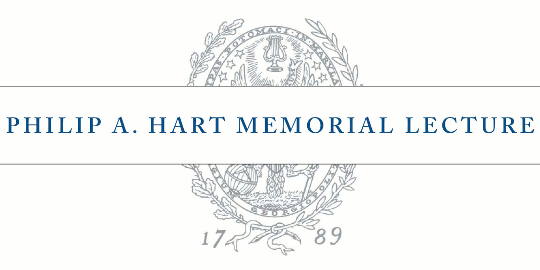Submissions from 2019
The Opening Argument for D.C. Statehood, Muriel Elizabeth Bowser
Date: 2019
Submissions from 2018
Locking Up Our Own: Race, Class, and the Politics of Mass Incarceration, James Forman Jr.
Date: 2018
Submissions from 2017
Criminal Justice Reform: How We Got Here, Why We Need It, and the Path Forward, Sally Yates
Date: 2017
Submissions from 2016
The Superior Virtues of Historical Originalism, Jack Rakove
Date: 2016
The Freedom to Marry Win: Transformation and Triumph to Celebrate, Lessons to Adapt and Apply, Evan Wolfson
Date: 2016
Submissions from 2014
The National Criminal Justice Commission Act – A Microcosm of Congressional Paralysis, James H. (Jim) Webb
Date: 2014
Submissions from 2013
The Strange History of The Bill of Rights, Pauline Maier
Date: 2013
Submissions from 2012
A Journey from the Heart of Apartheid Darkness Towards a Just Society: Salient Features of the Budding Constitutionalism and Jurisprudence of South Africa, Dikgang Moseneke
Date: 2012
Submissions from 2011
Courts, Social Change, and Political Backlash, Michael Klarman
Date: 2011
Submissions from 2010
Constitutionalism: A Skeptical View, Jeremy Waldron
Date: 2010
Submissions from 2009
Constitutional Law and International Law: National Exceptionalism and the Democratic Deficit?, Michael Kirby
Date: 2009
Submissions from 2008
The Future of International Criminal Justice, Richard Goldstone
Date: 2008
Submissions from 2007
Human Rights in Times of Terror: A Judicial Point of View, Aharon Barak
Date: 2007
Submissions from 2006
The Refund Booth: Using the Principle of Symmetric Information to Improve Campaign Finance Regulation, Ian Ayres and Bruce Ackerman
Date: 2006
Submissions from 2005
The Structure of Academic Freedom, Robert C. Post
Date: 2005
Submissions from 2004
Equality in the American Constitution, Guido Calabresi
Date: 2004
Submissions from 2003
Will Anybody Know Who I Am? On Education, Justice, and Respect, Sara Lawrence-Lightfoot
Date: 2003
Submissions from 2002
The Internet’s Coming Silent Spring, Lawrence Lessig
Date: 2002
Submissions from 2001
Welfare, Children and Families: The Impact of Welfare Reform in the New Economy, William Julius Wilson
Date: 2001
Submissions from 1998
Religion-Centered Free Exercise: A Tribute to Justice Brennan, Stephen L. Carter
Date: 1998
Submissions from 1997
The World Bank’s Role in Controlling Corruption, Susan Rose-Ackerman
Date: 1997
Submissions from 1996
Do Curators Have Anything to Learn from Lawyers?, Michael Heyman
Date: 1996
Submissions from 1994
Thinking in an Emergency, Elaine Scarry
Date: 1994
Submissions from 1993
Life’s Dominion: An Argument About Abortion and Euthanasia, Ronald Dworkin
Date: 1993
Submissions from 1992
Two Cheers for Authority: Should Officials Obey the Law?, Frederick Schauer
Date: 1992
Submissions from 1991
Meanings of Marriage: The Structure of Marital Expectations in Nineteenth Century America, Hendrik A. Hartog
Date: 1991
Submissions from 1990
Government, Political Parties, and Liberal Democracy in the New Europe, Jean Blondel
Date: 1990
Submissions from 1989
A ‘Non-Power’ Looks at Separation of Powers, Alan B. Morrison
Date: 1989
Submissions from 1988
Some Call It ‘The Right to Die’, Yale Kamisar
Date: 1988
Submissions from 1987
The Decline of Cause, Judith Jarvis Thomson
Date: 1987
Submissions from 1986
Does the Criminal Law Have Much to Do with Crime?, John Kaplan
Date: 1986
Submissions from 1985
Nativity Scenes and Judicial Responsibility, Norman Dorsen and Charles Sims
Date: 1985
Submissions from 1984
The Training of Lawyers: From Bar Exam Passage to Full Lawyer Proficiency, Albert M. Sacks
Date: 1984
Submissions from 1983
Why Is the Federal Income Tax so Complicated?, Boris I. Bittker
Date: 1983
Submissions from 1982
Federalism–Old and New–and the Federal Courts, Carl McGowan
Date: 1982
Submissions from 1980
The Role of the Solicitor General in Shaping Issues for the Supreme Court, Wade H. McCree
Date: 1980

